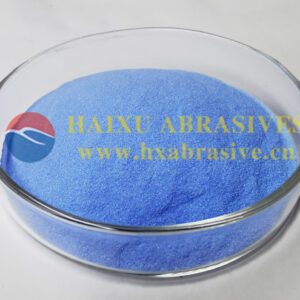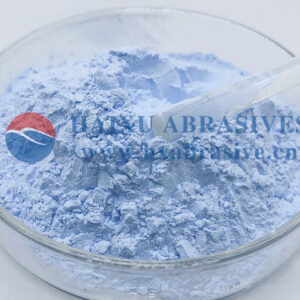As a widely used abrasive material, Carborundum is suitable for polishing, paint filler, wear-resistance coating because of excellent thermal and chemical properties.
1. High hardness
Silicon carbide’s hardness is just a little lower than diamond. Mohs hardness of black silicon carbide is 9.2-9.3, Mohs hardness of green silicon carbide is 9.4-9.5. The Vickers hardness of carborundum is 3100-3400kg / mm2. The hardness of silicon carbide will decrease with increasing temperature. At a high temperature of 1200 ° C, the hardness of silicon carbide can reach twice that of molten alumina.
2.Hihg Toughness
The toughness of silicon carbide abrasive refers to the difficulty of breaking under the action of an external force. Taking grain F46 as an example, the toughness of carborundum tested by the static pressure method is about 68-78%.
Compared with molten alumina, the mechanical strength of silicon carbide is higher. F120 for example, the compressive strength of silicon carbide is 186KN / cm2, and the compressive strength of corundum abrasive is 100KN / cm2.
3. The color of silicon carbide
Silicon carbide is divided into black silicon carbide and green silicon carbide. Its color is caused by the content and type of impurities in the crystal. Black silicon carbide is light blue-black, the purity of premium black SiC is 98%. Green silicon carbide is green, and the purity of premium green SiC is 99%.
4. Thermal conductivity and coefficient of linear expansion of silicon carbide
Even at a temperature of 25-1400°C, the average coefficient of thermal expansion of silicon carbide is 4.4×10-6 /°C, while the coefficient of thermal expansion of molten alumina is 7-8×10- 6 / °C.
5. The electrical conductivity of silicon carbide
Due to the introduction of impurities, silicon carbide has semiconductor properties. The conductivity of silicon carbide increases rapidly with increasing electric field strength, and it has a non-linear characteristic. In addition, the conductivity of silicon carbide also changes with temperature.
6. Silicon carbide has strong resistance to oxidation.
When heated to 1000 °Cin air, silicon carbide only oxidizes on the surface, forming a film of silicon dioxide. The film can protect the silicon carbide material from oxidation.
When heated to 1300 °C, cristobalite began to precipitate in the silicon dioxide film layer. The change in crystal form caused the film layer to crack, and the oxidation rate increased slightly.
When heated to 1500-1600 °C, the silicon dioxide film layer will thicken, and the ability to protect against oxidation will increase. So, silicon carbide could be very stable at high temperature. When heated above 1627°C, the oxidation resistance of silicon carbide decreases rapidly.
7. Silicon carbide has strong chemical stability.
The chemical stability of silicon carbide is also due to its ability to resist oxidation.




